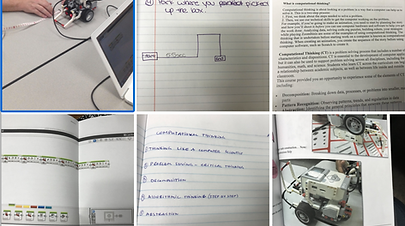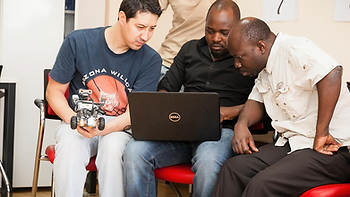
ERDOGAN KAYA
Kaya is an assistant professor of education in the College of Education and Human Development at George Mason University. He has a Ph.D. in Curriculum & Instruction and teaches methods courses. He received his MS degree in computer science and engineering and holds a BS degree in chemical engineering. He coached robotics teams and was awarded several grants that promote Science, Technology, Engineering, and Mathematics (STEM), and Computer Science (CS). He is interested in inspiring learners to code and engineer for social causes to increase participation and make STEM+CS accessible for all. He has been volunteering in many educational outreach programs including Code.org, Science Fair, and Robotics programs such as First Robotics competitions. Over the past five years, he published journal papers and presented at national and international conferences about computational thinking, K-12 computer science, robotics, and pre-college engineering education. Areas of research interest include K-16 computing and engineering education, STEM+CS, computational thinking, and robotics in K-12 STEM+CS education.
Kaya advocates his view that research, teaching, and learning are best practiced as a unified enterprise that benefits students and society. He has received numerous teaching awards as well as grants for his research from several foundations. Prior to academia, Kaya worked as a K-12 computer science teacher at racially and linguistically diverse schools.
Examples of Kaya's research can be found at his Research Gate profile: https://www.researchgate.net/profile/Erdogan_Kaya2
CSTA Workshop
11.07.2016
NSTA Workshop
27.07.2016
UPCOMING EVENTS
SITE Conference
03.20.2019
SITE Workshop
03.18.2019
NSTA Workshop
10.11.2018
MY LATEST RESEARCH

With the release of Next Generation Science Standards (NGSS), Computational Thinking (CT) entered into the lexicon of science educators and researchers. Assessing K-12 science teachers' self-efficacy beliefs to teach Computational Thinking (CT) emerged as a viable research topic. Bandura defines self-efficacy beliefs as
awareness of the individual's potential and capabilities to accomplish a goal. Self-efficacy beliefs of teachers is a significant identifier of teachers' performance and
motivation in teaching the specific content successfully; however, K-12 science teachers' CT teaching efficacy beliefs are rarely discussed. Participating pre-service
elementary teachers (PST) enrolled in an undergraduate elementary science teaching
methods course during the Spring and Summer 2018 semesters in a southwestern state university. We administered a CT self-efficacy survey at the beginning and end of the related unit (i.e. the intervention). During the intervention, the PST followed the
NGSS CT practices by building educational robots, coding visual block based programs, and solving puzzles in the video game: Zoombinis. In this paper, we report the impact of the intervention on CT teaching efficacy beliefs of PST.
In this paper, a detailed account of the methods and practices used in an extracurricular robotics club at a culturally diverse, low-socioeconomic Title 1 School is provided. As students collaborate within the team and compete against other schools in FIRST Robotics’ FIRST TECH Challenge ® (FTC), they are expected to gain experience in problem solving, programming,
fundraising, documentation, and community outreach. The aim of this paper is to evaluate the premise that Science, Technology, Engineering, and Mathematics (STEM) through robotics has an effect on minority students’ confidence to pursue STEM related careers after a college education. We also attempted to evaluate if the participants’ attitude about learning new things changed as the students grow to become life-long learners.

This paper describes the details of an intensive one-day robotics workshop designed to introduce the basics of educational robotics to 10 Ugandan secondary information technology teachers. At the end of the workshop, a survey was administered to the participating teachers. The workshop was successful in sparking teachers’ interest in robotics. Five out of 10 teachers participated in a regional robotics competition with their own school teams 5 months after participating in the workshop. The other 5 teachers planned to participate in the same regional robotics competition in the following year. This study suggests that robotics programs offer an opportunity for students in developing countries such as Uganda to become deeply involved in STEM activities and develop an interest in STEM careers. Further research might focus on teacher professional development that is a critical factor mediating students’ access to quality STEM education in developing countries.






